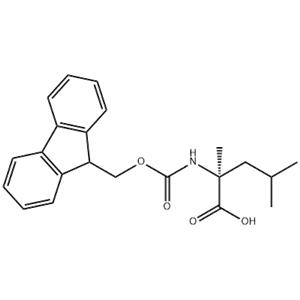Solid-Phase Peptide Synthesis (SPPS):Fmoc-α-Me-Leu-OH is a valuable building block in solid-phase peptide synthesis due to its high reactivity and stability. The Fmoc group allows for selective deprotection and coupling with other amino acids, enabling the sequential assembly of peptides on solid support. The α-methyl substitution on the leucine side chain can affect the conformational properties and binding affinities of the resulting peptides. This modified leucine residue can be used to introduce conformational constraints or enhance the interaction with target molecules in peptide-based therapeutics or biosensors. Protein Mimics and Peptidomimetics:Peptides containing Fmoc-α-Me-Leu-OH can be used as protein mimics or peptidomimetics. The α-methyl substitution can mimic the steric bulk of certain amino acid side chains in proteins, allowing for the synthesis of peptides that mimic the conformational or functional properties of proteins. These peptidomimetics can be used in various applications, such as inhibitors of protein-protein interactions, enzyme inhibitors, or probes for studying protein function. Biological Assays and Drug Discovery:Peptides containing Fmoc-α-Me-Leu-OH can be used in biological assays to study protein-protein interactions, receptor binding, or enzymatic activities. The α-methyl leucine residue can provide additional conformational stability or binding affinity to the peptide, affecting its biological activity. | 
 China
China



